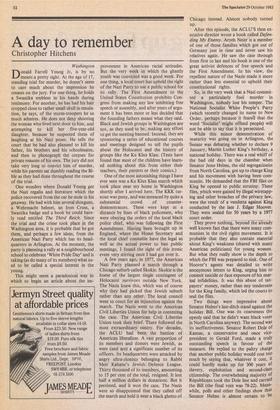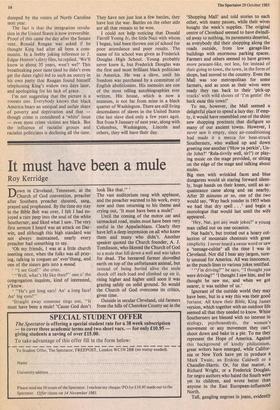A day to remember
Christopher Hitchens
Washington nonald Farrell Young Jr, is by no
means a pretty sight. At the age of 17, standing trial for murder, he doesn't seem to care much about the impression he creates on the jury. For one thing, he holds a Swastika emblem in his hands during testimony. For another, he has had his hair cropped close to rather small skull in emula- tion, he says, of the storm-troopers he so much admires. He does not deny shooting the woman who lived next door to him, and attempting to kill her five-year-old daughter, because he suspected them of laughing at his Nazi poses. He tells the court that he had also planned to kill his father, his brothers and his schoolmates, and then to photograph the corpses for private reasons of his own. The jury did not take very long to convict him of murder, while his parents sat dumbly reading the Bi- ble as they had done throughout the course of the trial.
One wonders where Donald Young got the Nazi regalia and literature which the police recovered from the car he stole in his getaway. He had with him several shotguns, a Wehrmacht helmet, an Iron Cross, a Swastika badge and a book he could bare- ly read entitled The Third Reich. Since the trial and the crime took place in the Washington area, it is probable that he got them, and perhaps a few ideas, from the American Nazi Party which has its head- quarters in Arlington. At the moment, the party is planning a rally at a neighbourhood school to celebrate 'White Pride Day' and is taking (as do many of its members) what us- ed to be called a special interest in the young.
This might seem a paradoxical way in which to begin an article about the im- provement in American racial attitudes. But the very week in which the ghastly youth was convicted was a good week. For one thing, a local court has upheld the right of the Nazi Party to use a public school for its rally. The First Amendment to the United States Constitution prohibits Con- gress from making any law inhibiting free speech or assembly, and after years of argu- ment it has been more or less decided that the founding fathers meant what they said. Black and Jewish groups in Washington are not, as they used to be, making any effort to get the meeting banned. Instead, they are sponsoring a series of educational courses and meetings designed to tell the pupils about the Holocaust and the history of groups like the Ku Klux Klan. (Tests have found that most of the children have learn- ed nothing about this from either their teachers, their parents or their comics.) One of the most astonishing things I have ever seen was a Ku Klux Klan march which took place near my home in Washington shortly after I arrived here. The KKK tur- nout was puny, and was menaced by quite a
substantial crowd of counter- demonstrators. These were kept at a distance by lines of black policemen, who were obeying the orders of the local black police chief, who was following the First Amendment. Having been brought up in England, where the Home Secretary and the local chief constable have the legal as well as the actual power to ban public meetings, I found the sight of this ironic event very stirring once I had got over it.
A few years ago, in 1977, the American Nazi Party planned a march through a Chicago suburb called Skokie. Skokie is the home of the largest single contingent of Holocaust survivors outside New York. The Nazis knew this, which was of course why they had picked that Jewish suburb rather than any other. The local council went to court for an injunction against the march. The Nazis went to the American Civil Liberties Union for help in contesting the case. The American Civil Liberties Union took their brief. There followed the most extraordinary outcry. For decades, the ACLU had been the bastion of American liberalism. A vast proportion of its members and donors were Jewish, as were (and are) a significant number of its officers. Its headquarters were attacked by angry ultra-zionists belonging to Rabbi Meir Kahane's Jewish Defence League. Thirty thousand of its members, amounting to 15 per cent of the total, resigned. It lost half a million dollars in donations. But it persisted, and it won the case. The Nazis were so disappointed that they called off the march and held it near a black ghetto of
Chicago instead. Almost nobody turned up,
After this episode, the ACLU'S then ex- ecutive director wrote a book called Defen- ding My Enemy. Aryeh Neier is a member of one of those families which got out of Germany just in time and never saw his relatives again. He saw the case through from first to last and his book is one of the great activist defences of free speech and the First Amendment. In his view, the repellent nature of the Nazis made it more rather than less essential to uphold their constitutional rights.
So, in the very week that a Nazi commit- ted a particularly foul murder in Washington, nobody lost his temper. The National Socialist White People's Party (which recently changed its name to New Order, perhaps because it fearea that the word 'Socialist' might offend people) will not be able to say that it is persecuted.
While this minor demonstration of maturity was going on in Arlington, the Senate was debating whether to declare 9 January, Martin Luther King's birthday, a national holiday. There was a real whiff of the bad old days in the chamber when Senator Jesse Helms, the old segregationist from North Carolina, got up to charge King and his movement with having been com- munist. He demanded that the FBI files on King be opened to public scrutiny. These files, which were gained by illegal wiretapp- ing and other breaches of the privacy law, were the result of a vendetta against King conducted by the late J. Edgar Hoover. They were sealed for 50 years by a 1977 court order.
They prove nothing, beyond the already well known fact that there were many com- munists in the civil rights movement. It is probable that they also contain material about King's weakness (shared with many American politicians) for young women. But what they really show is the depth to which the FBI was prepared to sink. One of Hoover's agents was detailed to write anonymous letters to King, urging him to commit suicide or face exposure of his mar- ital infidelities. It was this abuse of tax- payers' money, rather than any tenderness for the King family, which led the courts to seal the files.
Two things were impressive about Senator Helms's last-ditch stand against the holiday Bill. One was its coarseness (he openly said that he didn't want black votes in North Carolina anyway). The second was its ineffectiveness. Senator Robert Dole of Kansas, a conservative and once vice- president to Gerald Ford, made a truly outstanding speech in favour of the measure. He replied to the paltry charge that another public holiday would cost too much by saying that, whatever it cost, it could hardly make up for 300 years of slavery, exploitation and second-class citizenship. The overwhelming majority of Republicans took the Dole line and carried the Bill (the final vote was 78-22). Mean- while, polls and other findings show that Senator Helms is almost certain to be
dumped by the voters of North Carolina next year.
The fact is that the integration revolu- tion in the United States is now irreversible. Proof of this came the day after the Senate vote. Ronald Reagan was asked if he thought King had after all been a com- munist. In a feebly joking reference to J. Edgar Hoover's dirty files, he replied, 'We'll know in about 35 years, won't we?' This breathtaking poor taste (and he didn't even get the dates right) led to such an outcry in his own party that Reagan found himself telephoning King's widow two days later, and apologising for his lack of grace.
I'm not suggesting that the picture is a roseate one. Everybody knows that black America bears an unequal and unfair share of poverty and deprivation and that — though crime is considered a 'white' issue — even most crime victims are black. But the influence of racialist groups and racialist politicians is declining all the time. They have not just lost a few battles, they have lost the war. Battles on the other side are all that remain to be won.
I could not help noticing that Donald Farrell Young Jr, the little Nazi with whom I began, had been thrown out of school for poor attendance and poor results. The name of his school was given as Frederick Douglas High School. Young probably never knew it, but Frederick Douglas was the first and most brilliant black politician in America. He was a slave, until his freedom was purchased by a committee of English abolitionists. His memoirs are one of the most telling autobiographies ever written. His house, which is now a museum, is not far from mine in a black quarter of Washington. There are still living descendants of slaves in the United States (the last slave died only a few years ago). But from 9 January of next year, along with Columbus, Washington, Lincoln and others, they will have their day.















































 Previous page
Previous page